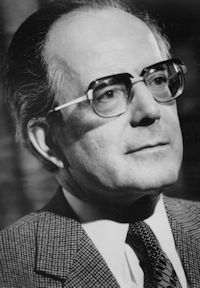When the Bundesrepublik came back into the fold of peoples and the Deutsche Mark started soaring due to the Wirtschaftswunder (economic miracle) the great prima donna’s started to perform in Germany again. We owe two important live performances by Renata Tebaldi to this phenomenon. As they were broadcasted all over Western Europe I watched both of them almost 50 years ago. I was so disillusioned when I discovered Tebaldi’s Otello was not Del Monaco but the unknown tenor Hans Beirer. The gentleman had already many years of strenuous roles behind the belt but no recording firm had ever thought of offering him a single record. He was almost completely unknown to people outside the profession. Not without reason as his voice was second rate and his sense of Italian style owed more to bawling Siegmund than to singing Riccardo. Soon afterwards I became a subscriber to Opera Magazine where his name regularly popped up. I couldn’t understand why he was allowed to sing in a temple as La Scala. Nowadays when we see things in a more historical perspective reasons for his Scala performances are more easy to explain. Like all other major European theatres La Scala was slowly dumping old traditions; one of them singing opera in a language the audience could understand. This Tannhäuser was one of the first productions to be sung in the original German (as late as 1974 Jenufa was still performed in Italian).Another reason for the German version was the fact that no major Italian tenor could be found to sing the role of Tannhäuser. Gone were the Wagner-days of Gino Penno, Mario Del Monaco (Lohengrin at La Scala) or Giuseppe Di Stefano (Rienzi in the same theatre). So Beirer came in and at first the sound is not a thing of beauty; dry, unattractive timbre, resemblance with 70year old Rudolf Schock. But at the end of Act 1 the voice becomes more powerful while he never roars. During the rest of the performance he has found his Vickers-sound; beefy but with some shine on it. In short a real pro who absolutely knows how to pace. The same is noticeable in the long bonus scene from Siegfried recorded at San Carlo two years later (he was 58). There is not much lustre in his dialogue with Mime but when the forging song is there, so is the voice. As could be expected Sena Jurinac is a splendid Elisabeth. With her warm Slavonic sound (half-Italian, half German; combining the best of two worlds) she succeeds in making Elisabeth less virgin and more woman. Only at the top of the voice is the sound a bit frayed as she too was already a veteran of many operatic wars. Janis Martin is not especially erotic and in her clear light sound one already hears a soprano struggling to come out. In fact, on record Jurinac sounds more sensuous than Venus. Martti Talvela is an imposing Landgraf and Victor Braun delivers an excellent ode to the evening star. He too didn’t have much of a recording career and his big voice easily fills La Scala; at the same time showing warmth and charm. Sawallisch is sympathetic to his singers, never rushing them in what is after all a voice-wrecker for the tenor. It comes as a surprise though that the La Scala chorus sounds rather tame, less incisive and powerful than usual. Then one remembers that this generation was asked to sing for the first time in a completely foreign idiom.
Jan Neckers







